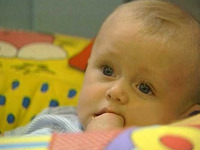Families with autistic children run higher risks of having another child with ASD
 Among families who have a child with an autism spectrum disorder (ASD), the risk of a subsequent child developing an ASD may be higher than previously estimated, a multicenter study showed.
Among families who have a child with an autism spectrum disorder (ASD), the risk of a subsequent child developing an ASD may be higher than previously estimated, a multicenter study showed.
In a study of 664 infants born into familes with an affected child, the ASD recurrence rate was 18.7% (95% CI 13.34% to 25.5%), with greater risks in male infants and in those with more than one affected older sibling, according to Sally Ozonoff, PhD, of the MIND Institute at the University of California Davis, and colleagues.
Most previous studies have put that figure at 3% to 10%, with one recent report estimating a 14.2% recurrence rate, the researchers reported online ahead of the September issue of Pediatrics.
Susan Levy, director of the Regional Autism Center at Children's Hospital of Philadelphia, said in an interview with MedPage Today that she is not surprised by the higher rate.
"There have been hints and suggestions from data from different, smaller studies that have implied that the recurrence risk is really higher than the 10% that we have ended up quoting," said Levy, who is a member of the American Academy of Pediatrics' autism subcommittee, says MedPage Today.
One month before William and Carissa Hawn's second son was born, their first son, Logan, then 3, was diagnosed with autism.
"Logan was our first experience with autism," said William Hawn, 34, of Modesto, Calif.
But when their second son, Aaron, was born, his pediatrician told the Hawns there was a 10 percent chance that he too would develop autism.
Earlier studies are consistent with Aaron's pediatrician. Infants who have siblings with autism have a 3 to 10 percent increased risk for autism, a higher chance than the 1 percent risk among the general population, according to ABC News.
Subscribe to Pravda.Ru Telegram channel, Facebook, RSS!


